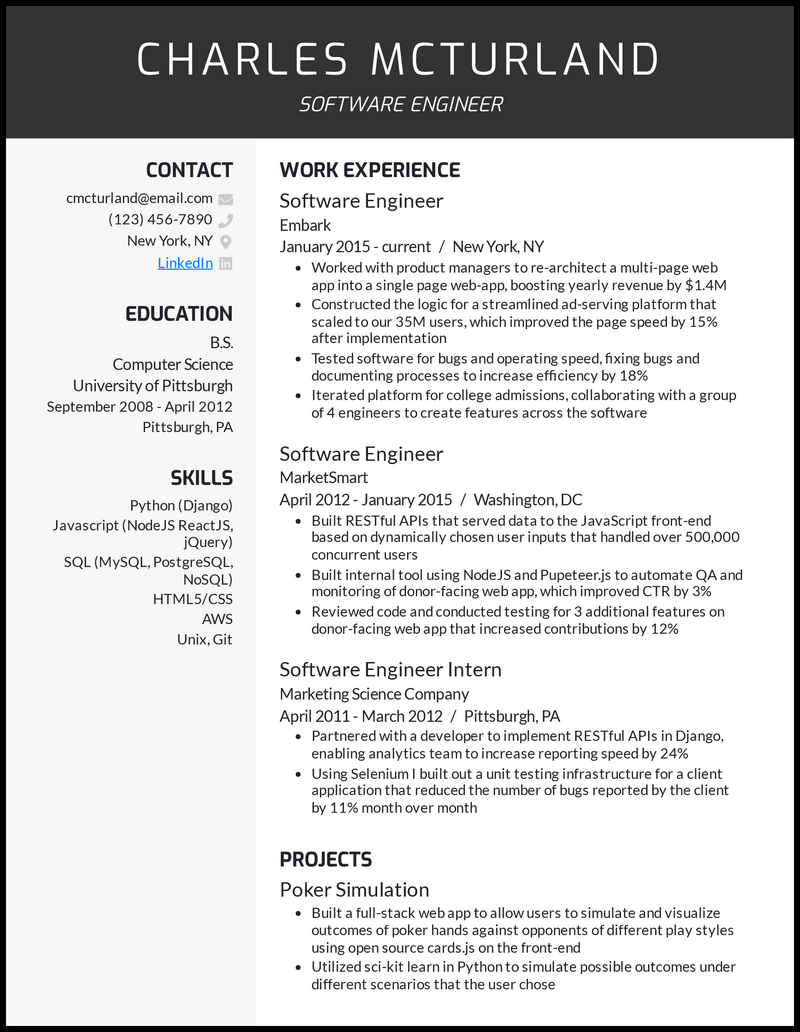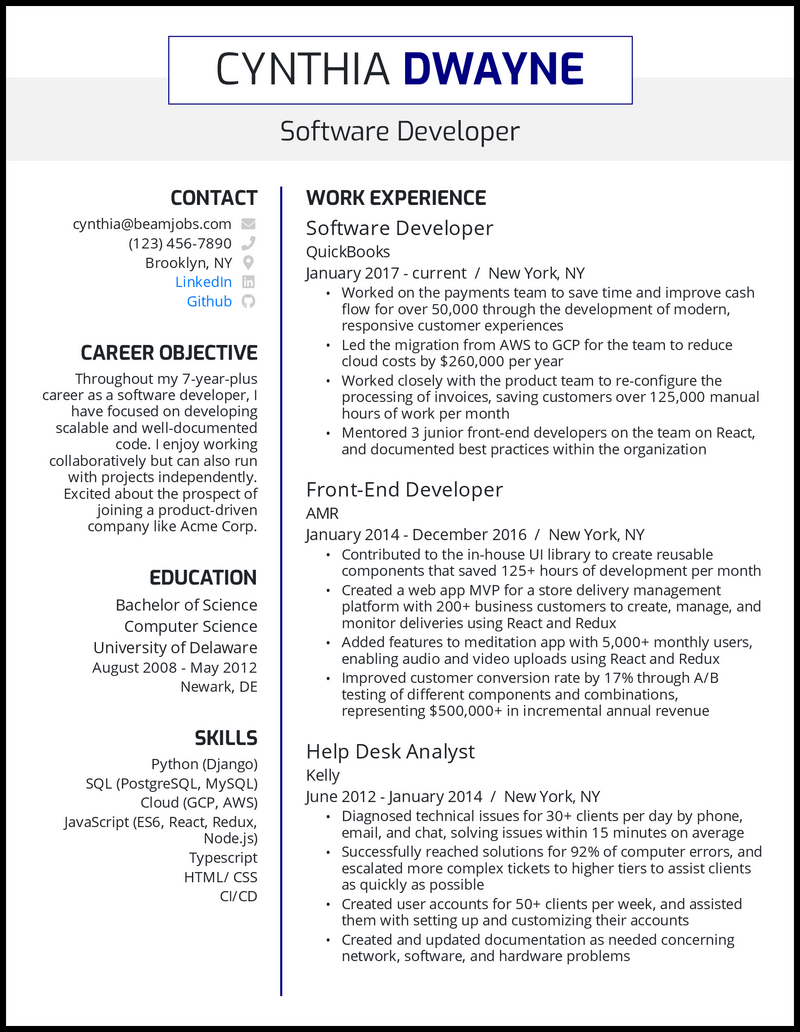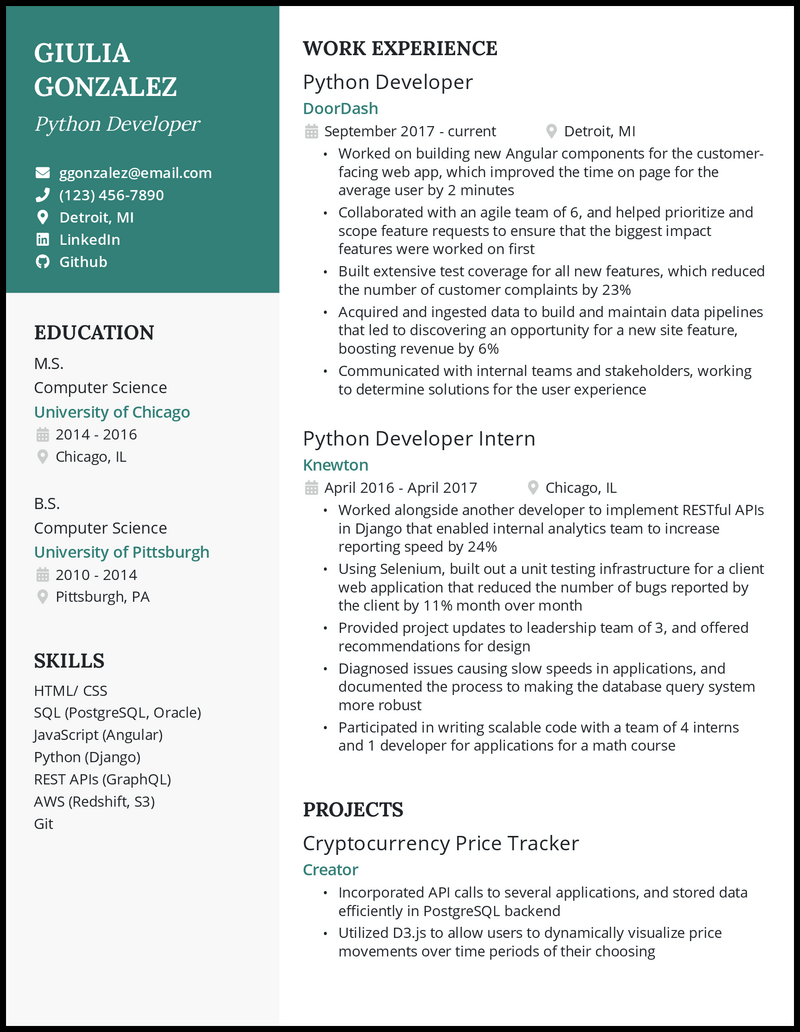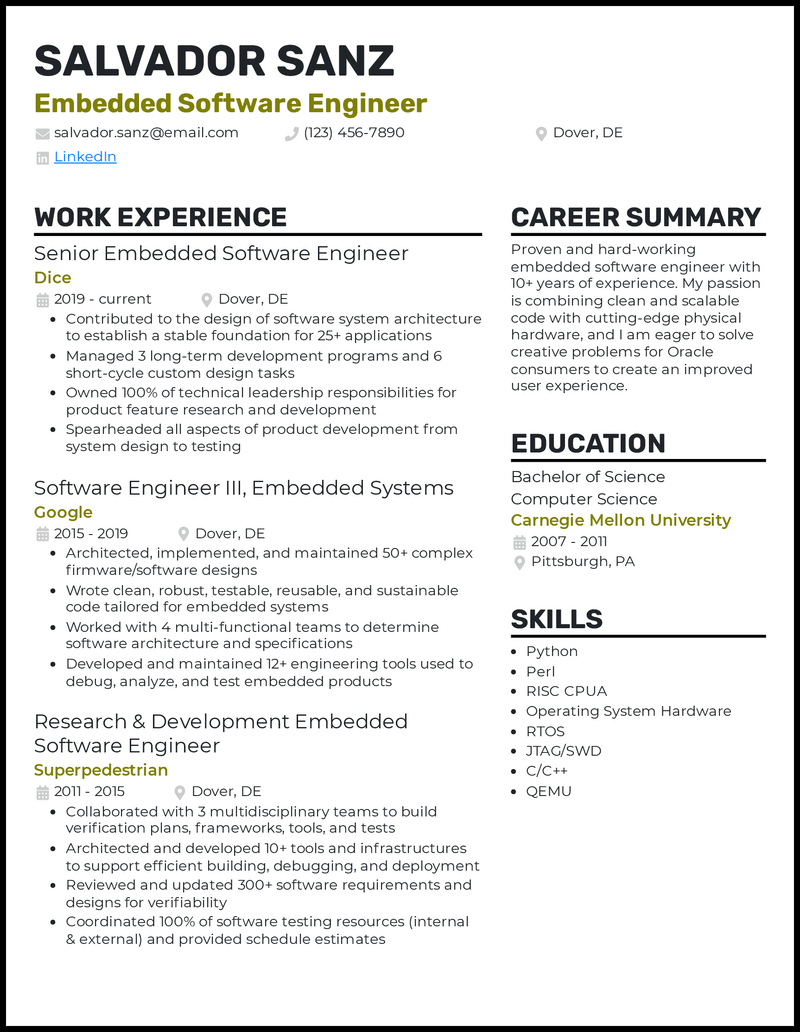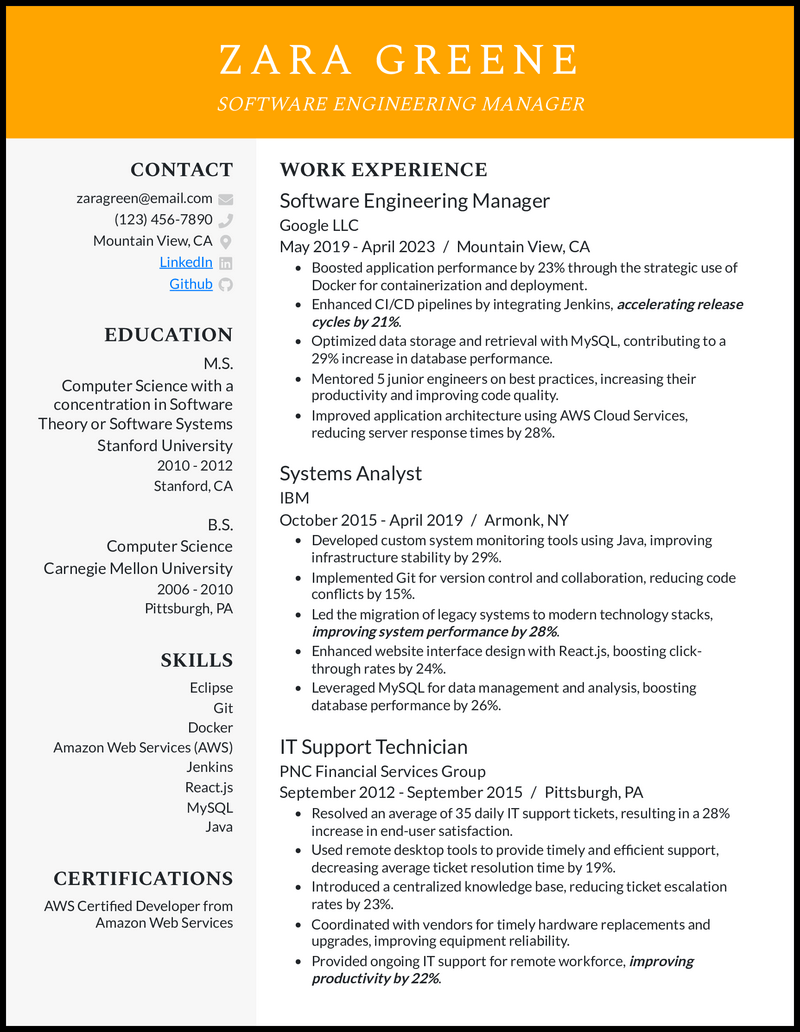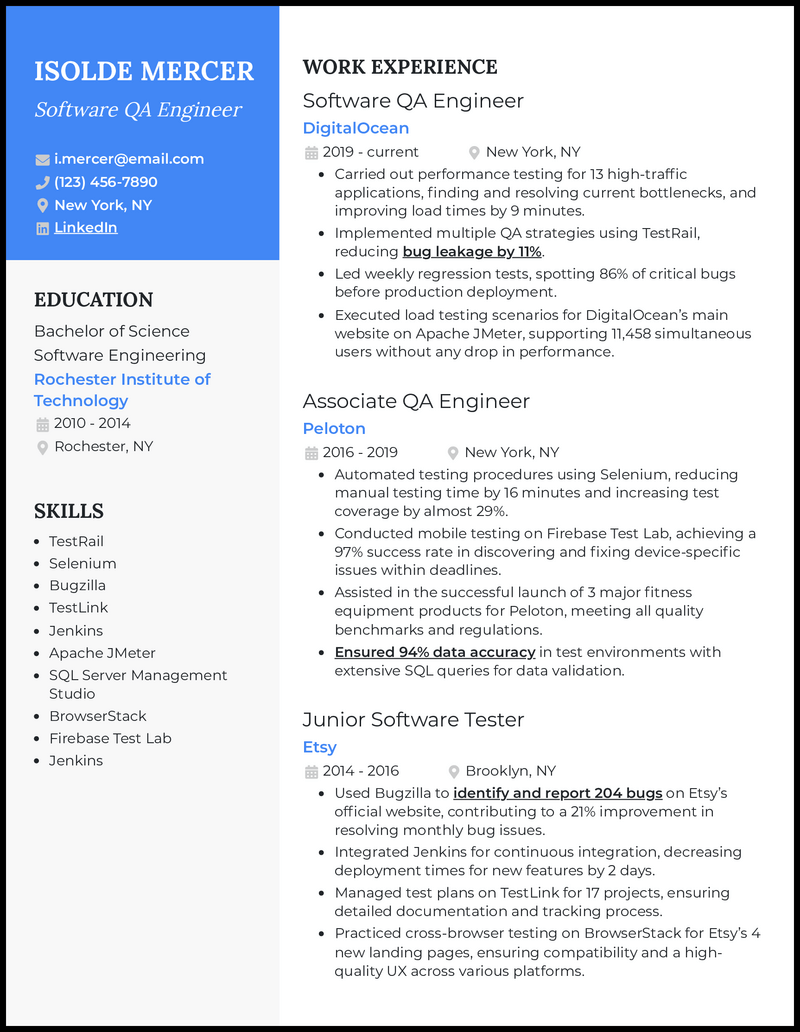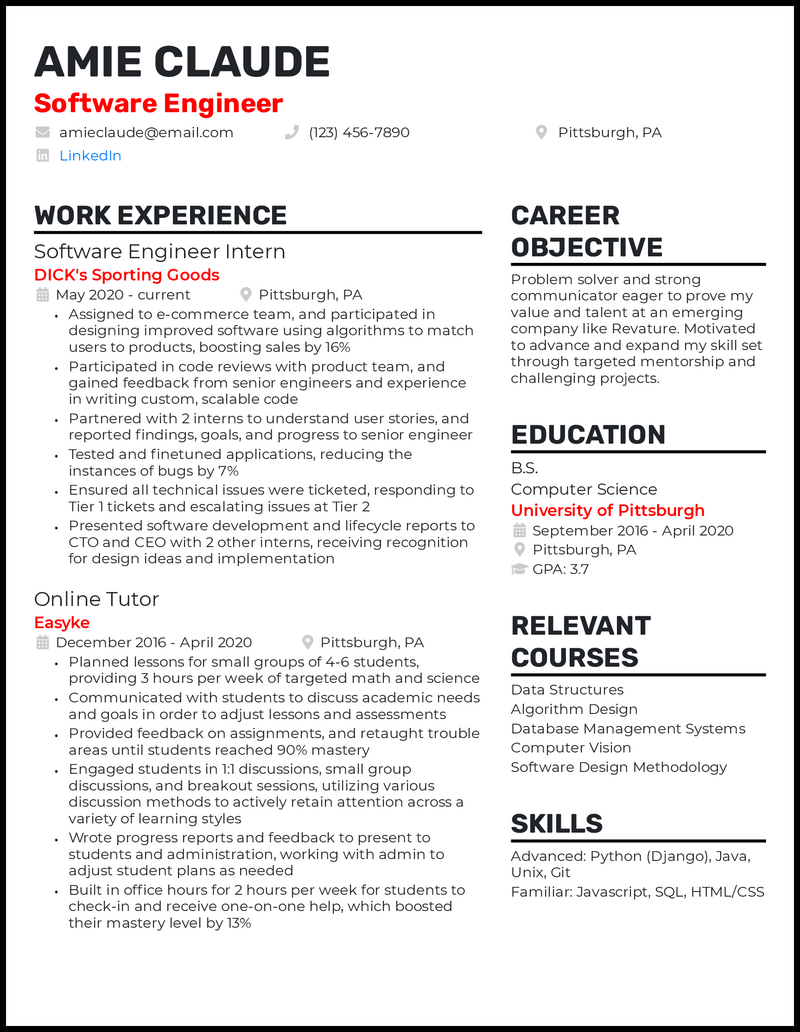To stand out, your software engineer resume needs to prove engineering impact, not just participation. Generate bullet points that use technically specific action verbs paired with metrics, tools, and outcomes laid out in clear, skimmable sections that make it easy for recruiters to find important information.
Choose a resume template that highlights what matters first: relevant skills, production experience, shipped projects, and keywords to surface in hiring systems or AI retrieval.
Here’s what we’ll cover:
- ↪ 34 real software engineer resume samples with analysis and takeaways
- ↪ What to include (and what to avoid)
- ↪ How to write high-impact bullet points that show results, not tasks
Why this CV works
- After choosing specific experience for your bullet points for your software engineer resume template, such as rearchitecting a multi-page web app, think about how you can show business impact: quantify your work, which may have resulted in increased revenue, user counts, efficiency, etc.
Why this CV works
- In the software life cycle of “create, maintain, improve, and delete,” a software developer is primarily a creator and maintainer. However, because of the amount of niche positions, be careful when adding a job title to your developer resume. Always adjust the title on your resume to match the title listed in the software engineer job description.
Why this CV works
- Highlighting a career with increased responsibility and leadership in your software engineering roles is key to getting noticed, especially when you back it up with numbers.
See more senior software engineer resumes >
Why this CV works
- Python developers aren’t very common outside the typical confines of the data analyst/scientist or machine learning world. That said, it’s all the more important that your Python developer resume continuously points toward having well-rounded experience by including a projects section.
See more of python developer resumes >
Why this CV works
- Rather than listing soft skills, seek to demonstrate communication and collaboration with teams in your work experience bullet points on your resume with context and impact.
See more embedded software engineer resumes >
Why this CV works
- Focus on mentioning your expertise in Java from the get-go. Use the most recent work experience in your Java software engineer resume to label how you’ve used the language to create/optimize existing systems and quantify your contribution.
Why this CV works
- Including technical courses like ‘Computer Organization and Architecture’ in your software engineer intern resume will show them you have a solid understanding of the fundamentals.
See more software engineer intern resumes >
Why this CV works
- Adding tools and cloud-based services under the Google Cloud umbrella to your Google software engineer resume shows the company you’re well-versed in multiple development solutions.
See more Google software engineer resumes >
Why this CV works
- Including measurable results in your software engineering manager CV will assist an employer in assessing the progress and outcomes you’ve contributed to companies you’ve previously worked with. This straightforward inclusion of observable statistics can significantly differentiate your CV from others.
See more software engineering manager CVs >
Why this CV works
- Demonstrate how your programming skills have evolved or how your interpersonal abilities helped advance your team. And be sure to back your claims with data. Cut the fluff away from novice jobs to leave room for more impressive credentials you earned later in your career.
Why this CV works
- Your time as a developer in a personal endeavour may have involved several responsibilities and achievements that would make a valuable addition to your junior software engineer CV.
See more junior software engineer CVs >
Why this CV works
- Did your overhaul of the MYSQL schema indexing speed up data access? Mention the time saved in hours per month or week. Can you detail how many technical guides you created or published, or how many users benefited from your software programmes? Please specify the numbers. Savings in pounds should also suffice in your metrics.
Why this CV works
- Adding hobbies, for example in this resume, participating in coding challenges and hackathons can show you’re passionate about software engineering outside work hours—something any employer will love to see.
See more principal software engineer resumes >
Why this CV works
- One way to demonstrate experience level is to include a relevant certification on your experienced software engineer resume. Good examples include a Certified Software Development Associate (entry to mid-level) and Certified Software Development Professional (seniors).
Why this CV works
- It is crucial that your director of software engineering CV highlights your figures for managing teams, reducing costs, streamlining processes, and effectively managing and prioritising resources to surpass targets and objectives.
See more director of software engineering CVs >
Why this CV works
- Make the best first impression on your employer by highlighting your master’s degree in computer science. It gives more credibility and shows that you’ve professionally learned how to lead other engineers and also keep systems running smoothly.
Why this CV works
- Writing a backend software engineer resume is a lot like building good code—your masterpiece must be bug-free (read, error-free). Grammar slip-ups, silly typos, spelling, and punctuation mistakes can easily sink your chances of getting an interview. Fix your resume before you send it off into the world.
Why this CV works
- For a new grad software engineer resume, talk about using Jenkins for integration automation, building custom UIs with Django, optimizing databases with MySQL, and more that you uncover in the company’s job description.
Why this CV works
- List your best achievements so far like “Grew Amazon Prime subscriptions by 18%” to show your to-be employer you’ve got what it takes to leverage technology and use it to drive better customer experience metrics.
Why this CV works
- If the job description places significant emphasis on jQuery, focus on discussing how you’ve utilised that rather than your experience with Cash.js.
See more associate software engineer CVs >
Why this CV works
- Share technical highlights on your front-end software engineer resume, like automating front-end testing with Jest or reducing site load time, to prove you won’t be hired for nothing.
Why this CV works
- Add as many education qualifications as you possess to maximize the impression that you’re a certified software developing maestro. These aren’t just fancy additions to your resume but proof of your problem-solving and critical skills, making you the go-to guy for any tech need.
Why this CV works
- Take a minute to revisit every programming language you’re proficient in. You’ve got a long list you can add to a resume outline, but only include skills mentioned in the company’s job description.
Why this CV works
- Use the skills section of your software engineer new grad resume to highlight the technical knowledge and expertise you can bring to the company you’re applying to. Review the job description to know the company’s requirements and adjust the skills you include.
See more software engineer new grad resumes >
Why this CV works
- Including skills like PostgreSQL, Apache Hadoop, and Git enrich your FAANG software engineer resume prove to employers that you’re basically the Swiss Army knife of technology, all ready to confront any software needs Silicon Valley throws your way.
Why this CV works
- A stellar education section should show off your relevant tertiary training, such as a Bachelor’s in Computer Science. Right below that, specify the university you attended, its location, and the years you spent there. And if you’re holding two degrees, remember that the master’s degree takes precedence.
Why this CV works
- Draw out important impacts you’ve created on the job such as reducing coding errors and expanding test coverage to be a standout candidate.
Why this CV works
- As long as you have relevant project experience, you’ll be all set. Plus, you could utilise a strong career objective that clearly states why you want to join the specific company and your main goal after being hired.
Why this CV works
- Show off any internships you’ve gotten. You can treat them like work history, listing them in the experience section of your tech resume template and quantifying impact when you can.
See more entry-level software engineer resumes >
Why this CV works
- The fact that the software engineering market is booming is a double-edged sword—there are plenty of lucrative opportunities like the one you’re eyeing right now, but the competition is insane. To come come out top pack your resume with technical skills like Python, React, and MySQL or a job-relevant educational background, such as a degree in software engineering.
Why this CV works
- Your mid-level software engineer CV should highlight achievement metrics that demonstrate your proficiency with application tools, process optimisation, reduction in project timelines, and ability to utilise resources to meet expected outcomes.
Why this CV works
- In your resume skills section, include the programming languages—JavaScript, Python, Go—the company requests explicitly in the job description to strategically align your full-stack engineer resume and better fit the ATS screening criteria.
Why this CV works
- If the new role you’re applying for is seeking front-end work, focus on skills in CSS, React, and Angular, for instance, which are likely mentioned in the job description and you need them on your software engineer front end resume as well.
Why this CV works
- Software engineer CV templates should have a good “visual voice” that’s as unique as you, so don’t be afraid to play with colours, font types, and layouts. As long as it’s easy to read, format your CV to match your style.
See more software integration engineer CVs >
How to Format a Software Engineer Resume

You understand the importance of maintaining clean code and ensuring that what the user experiences on the front end is aesthetically pleasing and functional. This line of thought needs to translate to your CV format.
The following will keep your technical CV template robust:
- Reverse-chronological format: This means you’ll list your most recent experience first, which gives recruiters an understanding of your current expertise and skill set. It will also demonstrate your career progression as an engineer.
- Contact header: This is arguably the most important thing you can include on a CV. If you forget or misspell your name, email address, location, phone number, LinkedIn, GitHub, or portfolio URL—well, it won’t matter how much you’ve reduced page load or developed components that improved user engagement. If the hiring manager can’t contact you, it’s a non-starter.
- Top SWE CV sections: At the very least, your CV will be incomplete without your work experience, skills, and education sections.
- Manageable chunks of text: It’s difficult to fit all your projects and experience on a single page. Instead of trying to list everything you’ve ever done, focus on what aligns best with the job description, quantifying your experience where possible to demonstrate business outcomes. More on this shortly.
- Keep verb tense consistent: Refer to previous roles and projects in the past tense and refer to your current position in either the present or past tense.
- Length of CV: Recruiters spend, on average, six to seven seconds reviewing your CV. They’re not going to read a several-page CV. You can get away with a two-page CV if you have over 10 years of experience, but even then, why risk it?
- File type: When you’re applying for software developer jobs, don’t end up in a muddle because you sent a file that got distorted. PDF is your best bet unless the company specifically requests a different file type.

Bullet point formatting
Your goal with your CV for software developer roles isn’t just to include your best points; it’s also to make the life of the person reviewing it as easy as possible. Avoid long paragraphs of text so it’s easier to read. This is especially important if you have a non-technical recruiter reviewing your software engineer CV. Break up what would be paragraphs into singular ideas that are more manageable for the reader.
Poor bullet point formatting
- Designed and developed the backend for a client application that allowed users to create their own recipe books. Used Angular on the front-end and NodeJS on the back-end. Worked closely with product managers to scale this application to 200,000 users, generating an annual revenue of $1.4 million. (If you’re still reading this, then well done, because it’s far too long.)
Effective bullet point formatting
You can present the same information in a much more digestible way using a couple of bullet points:
- Designed and developed the back-end for a client application using Angular and NodeJS, allowing users to create recipe books
- Worked with product managers to expand the application to 200,000 users and generate an annual revenue of $1.4 million
How to Write a Software Engineer CV

To secure a top-tier role in this competitive filed, your software engineer resume must pack a powerful technical punch, clearly show business impact, and be format-optimized for human scanning and AI retrieval. Therefore, your resume should mirror how engineers write code: clean, modular, and purposeful — leading with precision, clarity, and relevance.
Whether you’re browsing resume examples, trying to write a resume from scratch, or perfecting your resume format, remember: each section must answer this one key question—why you over everyone else?
Essential elements of a winning software engineer resume
- Clear summary statement
- Structured tech stack and skills section
- Quantified achievements
- Recruiter-centric and ATS-friendly resume format
- Keywords from the job ad
- Projects that show ownership
- Industry certifications and credentials
- Education, but de-prioritized

Why your resume must be ATS and recruiter optimized
When you apply for an engineering job, the first entity reviewing your CV is typically not a person. Companies use something called an Applicant Tracking System (ATS) to filter out candidates based on keywords.
If you pass this initial screening, it’s likely a recruiter will review your CV next—and there’s no guarantee this person will have a technical background.
So, how do you write a resume that jumps through all the hoops to snag the first interview? That’s what this guide is designed to help you do!

How to write work experience in a software engineer CV
Your work experience section is, without a doubt, the most important part of technical CV templates. It’s here that a recruiter will decide whether they want to move you onto the first stage of the interview process. So, this is not the place to be modest. Highlight the good work you’ve done.
If you’re a junior developer, this section will be shorter (in favour of a longer projects section). If you have over two years of work experience, this should take up the majority of the space on your software developer CV.
So how do you talk about your work experience convincingly?
Use hard stats to make technical work tangible, and not just describing tasks.
Common quantifiers include:
- Performance gains
- Downtime reductions
- Revenue impact
- Code coverage
- Team velocity improvements
Poor work experience description
Have a look at this poor bullet point description that overlooks the individual’s contribution to the project.
- The team changed our main product from a multi-page app to a single-page app, resulting in an additional £1.2 million in annual revenue.
Good work experience description
But note how this job seeker highlighted their specific contributions to the project in this good example.
- Designed the new back-end in Ruby to transform a multi-page main product app into a single-page app, resulting in £1.2M in annual additional revenue
Remember, when discussing your actual work, you should be specific about your particular contributions. However, when talking about the project’s impact, you can refer to the overall effect that the team achieved.
How to quantify your impact in developer CVs
Businesses employ engineers to drive the company forward, and the best way to demonstrate you can do that is to show you’ve made a measurable impact in your previous roles. Rough estimates of impact are acceptable if you don’t have exact figures; just be reasonable and logical in your assessments.
Here are some other ways you can try to measure your work:
- Reduced downtime by X%
- Increased the speed of the application by X%
- Implemented a product feature that increased customer retention by X%
- Increased customer satisfaction (as measured by NPS) by X%
- Developed a feature that increased the click-through rate by X%
- Scaled a product that successfully managed X simultaneous users
- Automated a process that saved X hours of manual labour each week
- Enhanced a product feature that boosted usage by X%
- Worked on a project that led to a cost saving of £X
- Implemented unit tests that increased test coverage by X%
- Fixed a bug that reduced customer complaints by X%
Follow this formula to generate bullet points that tell potential employers you’re the piece of the puzzle missing in thier tech team:
Action verbs + task accopmlished + specific tools/skills + metrics (where applicable) = measurable achievements
Examples:
- Optimized Redis caching to reduce API latency by 71%, improving response times for 10k+ daily requests
- Led migration to Kubernetes, cutting deployment errors by 88% and accelerating release cycles by 4 days
- Implemented LaunchDarkly feature flag system adopted by 4 engineering teams, reducing rollback time by 2 hours per incident

What skills should be in a software engineer resume?
Your software engineer resume should highlight both technical and collaborative skills. A good strategy here is to narrow your skills down to your line of specialization and not mentioning generic proficiencies that every other engineer will list.
The skills section is a vital part of your software engineer resume. This will make or break whether you get through the first phase of the resume review, aka the dreaded ATS scan.
The worst thing that can happen is that you claim knowledge of a programming language and then can’t answer basic questions about that language in an interview. It’s far better to have expertise in one programming language than to claim knowledge of ten.
Good companies recognise that skilled engineers can learn new frameworks as needed. So, it’s a big red flag if you list every programming language under the sun. Remember, a list of 30 skills and tools doesn’t equate to a good software engineer CV.
For example, for a backend developer resume, prioritize:
- Languages like Python, Java, or Node.js
- Frameworks like Django
- Databases (SQL/NoSQL)
- Infrastructure tools like Docker, Kubernetes, and AWS
- Soft skills like system design, debugging, and cross-team communication
The skills section is a vital part of your software engineer CV. This will determine whether you get through the first phase of the CV review, also known as the dreaded ATS scan.

How should I structure my resume skills section?
Your resume’s skills section shouldn’t be a laundry list of frameworks and programming languages. Don’t try to include what you wouldn’t be comfortable coding; just reading about Java is not enough to have it in your skills section.
It’s far better to have expertise in one programming language than to claim knowledge of 10.
Here are a few options for organizing the skills section on your resume:
Skills organised by proficiency
- Advanced: Python (Django), Java, Unix, Git
- Familiar: JavaScript, HTML/CSS, SQL

Alternatively, you can organise them by the type of skill you’re discussing. This way, you can separate the programming languages you know, the frameworks, the tools, and the databases you’ve used.
Skills organised by type
- Languages: Python, JavaScript, HTML/CSS, Java
- Frameworks: Django, NodeJS, ReactJS
- Tools: jQuery, Unix, Git, Selenium
- Databases: SQL (Postgre SQL, MySQL), NoSQL, AWS

Finally, you can list the programming languages you know and include the frameworks associated with that language you’ve used. You can also list your years of experience with that language. This is useful for recruiters, but it can take up a lot of space on your CV, so make sure your CV format allows for an extended skills section.
Skills organised by years of experience
- Python (Django) 8 years
- JavaScript (NodeJS, ReactJS, jQuery) 8 years
- SQL (Postgre SQL, MySQL, NoSQL) 8 years
- HTML 5/CSS 8 years
- AWS 5 years
- Unix, Git 8 years


How do you write an education section on a software engineer resume?
If you have a college degree, include it, of course, but you may find that SWE jobs are favoring skills over degrees.
If you’re applying for anything other than an entry-level role, that’s all you should include in your education section. Why? Because space is valuable on a CV, and your work experience and projects will convey more about your qualifications than your university courses or grades.
Suppose you’re applying for a software engineering internship or looking for your first full-time position. In that case, your education section should be more detailed to accurately convey your qualifications.
You might want to mention relevant courses for the role you’re applying for. For software engineering positions, this means any modules related to software engineering (obviously). Did you take a databases module? Completed a course in algorithm design? You get the idea.
If you want to include your GPA, make sure it’s above a 3.5. Otherwise, leave it out.
Education for a Graduate Software Engineer
Example
University of Pittsburgh – B.S. Computer Science
2016-2020
Pittsburgh, PA
Cumulative GPA: 3.7
Relevant courses: Data Structure, Algorithm Design, Database Management Systems

V
Senior software engineer qualifications
Example
University of Pittsburgh – B.S. Computer Science
2011-2015
Pittsburgh, PA


Do certifications matter on a software developer resume?
Certifications are useful for entry-level roles or when you want to signal specialty skills. They’re especially valuable in cloud (e.g., AWS Certified Developer) or security domains. However, for experienced developers, the real-world impact of a project carries more weight. Therefore, if you must include certifications, place them near the bottom, unless the job explicitly prioritizes them.

Other software engineering CV sections
Projects, an objective/summary, and/or hobbies and interests may be appropriate to include on your software development CV, depending on your level of experience and the company.
Projects
The size of the projects section on your software engineer CV should be directly linked to your level of seniority when applying for a developer role. The more junior your position, the more space you should allocate to your projects.
If you have more than two years of experience, you should only list one project you’re especially proud of. Most of your CV should be composed of what you did in your previous jobs.
Try to discuss your projects in the same way you would talk about your work experience. The aim of your projects is to demonstrate your technical skills in context. Show how you used a language or framework to create something that satisfied your curiosity or solved a problem.
Your projects should add more colour to your skills section. While it’s great to say you’re proficient in Ruby, it’s even better to explain how you built the back end of your film recommendation engine in Ruby. Anyone can list a skill on their CV, but showing how you used that skill demonstrates mastery.
If you worked on substantial coding projects during your studies, you should include them here. Whenever possible, always include the projects you’ve listed on your CV in your GitHub profile or on your personal website.
Here’s the format of how you should talk about your projects on your software developer CV template:
- Describe the problem you were trying to solve and how you solved it at a high level. In the example above, “Developed an Android app to enable party-goers to vote on which song should play next.”
- Next, discuss some technical details in either one or two bullet points.
Once again, you’re aiming to demonstrate two things to a hiring manager with your projects. Firstly, you want to provide context for the skills you list on your CV. Secondly, you want to show that you can identify a problem and then implement a solution to resolve that problem.
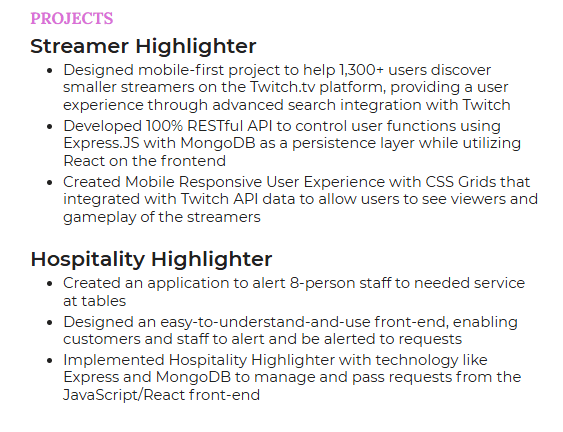
Career objectives or CV summaries
Unless it’s done exceptionally well, we strongly recommend that you don’t include a CV summary or objective in your software engineer CV. Why? Because they rarely convey meaningful information. While there are some differences between a summary and an objective, they have a lot of similarities, so we’ll break down the typical objective statement for you here, starting with a poor example:
I have over 3 years of experience and I’m looking to utilise my Django expertise to tackle challenging problems as a senior software engineer.
There isn’t anything new in this objective that can’t be easily found in the CV. Their 3+ years of experience and Django expertise should be demonstrated in their work experience. There’s no tailoring for the specific job, and it’s far too brief.
Remember, recruiters typically glance at your CV for mere seconds. Don’t make them waste precious time on anything that doesn’t provide new information about why you’re a great fit for the role.
It is possible to write a career objective that genuinely offers something new to the reader, but it requires a sharp eye and an understanding of the issues the company is aiming to resolve with the available position. If you’re ready for the challenge and willing to invest the extra time to create a tailored objective, go for it. It might look something like this.
Recent computer engineering graduate with strong problem-solving skills and a commitment to excellence, seeking a software engineer position at Salesforce. Eager to utilise my skills in Git and Python to support Salesforce’s vision of helping companies connect with their customers in innovative ways.
This example specifically addresses the company by name, and the candidate discusses how their particular skills can meet a need for the organisation.
Anything unique to your situation or circumstance (for example, you’re undergoing a career change) should be discussed when creating a covering letter. You can elaborate on what you’re looking for in your next role without the constraint of space.
Interests & hobbies
Most of the time, this section is unnecessary and takes up valuable space. However, if you’re a graduate software engineer or in an associate/junior position, it might be a good idea to include one or two specific hobbies or interests in your CV.
This is where you need to exercise some judgement, though, and “read” the company. Some companies value personality and emphasise cultural fit, so this would be the time and place to highlight a couple of hobbies or interests that might complement your CV and demonstrate that you’re well-rounded.
Personal hobbies such as game development, hackathons, or contributing technical articles to a blog are a few good ideas that can provide a more complete picture of who you are in the professional world of engineering.

How to tailor your software engineer CV to the job
The number one way you can increase your chances of securing interviews is by tailoring your software engineer CV to each job you apply for.
We understand—taking the time to tailor your CV for each application sounds tedious and frustrating, but the good news is that you don’t need to completely redo your CV. You just need to make adjustments that align with the software developer job description.
As you browse the company’s job listings, consider the projects you’ve worked on and the tech stack you’ve used in previous roles that align with the job advert. You’re looking for overlap—and that’s what you really want to focus on to create the best software engineer CV.
Now, let’s say the job advert mentions the following:

Clearly, they want an engineer experienced in developing APIs. You’ll want to make sure you discuss the work you’ve done associated with APIs (and its impact) in your work experience and skills section.
For example, one bullet point might appear like this in your experience section:
Designed and implemented a RESTful API for integrating third-party payment gateways, which reduced transaction processing time by 22% and subsequently decreased user drop-off at checkout by 42%.
Be specific about the skills you include in your skills list as well: Django, Postman, and AWS CloudWatch are just a few that might be relevant. Again, consider your past experience alongside what the job advert requires.

Beyond your software engineering resume
While your CV is your single most important document in your job search for the right software developer role, think beyond it. Recruiters and hiring managers expect to see a CV, so considering how you can get your foot in the door through other avenues has the potential to pay off significantly.
- Send a letter of interest
- A letter of interest expresses your enthusiasm for a software engineering role—even if a position isn’t currently available. Discuss your tech stack and some of your proudest achievements that align with the company’s goals, such as automating infrastructure management tasks that saved 10 manual hours a week. You can be sure the company will keep your letter on file, and when they need to hire, you’ll be at the forefront of their minds.
- Actively network
- We could write an entire post on this, but that’s not the aim of this guide. There are countless things you can do to show that you’re serious about job hunting and finding the right fit. Try optimising your LinkedIn and setting your profile to say open to work, collaborating on GitHub repositories, building your portfolio, participating in hackathons, or connecting with former lecturers or colleagues who could provide references.
- Complete your job application with a software engineer cover letter
- Even if it’s not required, writing a cover letter has the potential to tell a more meaningful story of your career accomplishments because it allows room for a few more details than your CV. Start with an engaging hook that shows your alignment with the role, share details of work achievements that attest to soft skills like teamwork and hard skills, such as implementing software with C#, and express your interest in further discussion to close.
Even if you’re not planning to leave your current job for another year, think ahead by using the above to extend beyond the reach of your CV. Now is the time to start working on securing your dream software developer role. Remember, to get your foot in the door, you have to start moving towards that door now!

Key takeaways
- Format your software engineer CV so that it’s one page, in reverse order, includes your contact information, work experience, skills, and education at a minimum, and uses manageable chunks of text instead of paragraphs.
- In your work experience, avoid simply listing job responsibilities and instead discuss tangible achievements, such as transforming a multi-page app into a single-page app.
- Show the business impact in your bullet points with metrics, such as revenue generated, time saved, and increased user engagement.
- Be selective with your skills list, choosing 10 or fewer that demonstrate your ability to work within the tech stack outlined in the job description.
- Keep your education and qualifications section concise and relevant to the role you’re applying for, and consider including projects, a personal statement, or interests/hobbies only if those elements would enhance your application.
- Customise your software engineering CV template for the job by highlighting skills and experience that align with the challenges and requirements mentioned in the job description. Have a look at various CV examples for inspiration.
- Aim to be a well-rounded job seeker by taking steps to connect with software engineering experts and colleagues and by reaching out directly to companies you’d be interested in working for one day.
Software Engineer CV FAQs

Hiring managers prioritize relevance to the job description above anything else.
Ensure your resume demonstrates:
Technical skills aligned with the role (languages, frameworks, tools)
Projects that show business impact
Problem-solving and collaboration
A public GitHub or portfolio
Tailor your software engineer resume to reflect the wishes of recruiters and AI bots by doing the following:
Customize each resume to the job’s niche (e.g., automation vs. web dev)
Align skills and experience sections with the job description
Emphasize impact over responsibilities
Create a structured skills section with no more than 10-12 relevant items. Follow these tips
Group skills by category: Programming Languages, Frameworks, Tools, Databases
Reflect terms used in the job description
Only list skills you’re proficient in
If you’re early in your career or a fresh grad, highlight projects like experience in this format:
Name of personal or academic projects
Description of what you built, and how
Showcase your tech stack and problem-solving in context
Measurable results
A senior software engineer resume should focus on leadership, architecture, and delivery. Here’s how to do it effectively, like the pro you are:
Use a reverse-chronological format to showcase career progression and more responsibilities
Skip the projects section and instead link to a GitHub or portfolio
Highlight experiences that highlight mentoring, cross-functional collaboration, and product impact
A resume summary is the much-needed retrieval-optimized intro block that sets the tone for the rest of your application.
Use it to:
Summarize your expertise, years of experience, and niche focus
Highlight top skills
Mention at least one core achievement
Match the language and expectations of the job
According to the US Bureau of Labor Statistics, the annual median salary for software engineers and developers is $130,160. The median hourly pay is $62.58. Not too shabby!
With the job outlook expected to grow 17 per cent between now and 2033, this is a comforting fact to spur you forward in your job search.
If you’re not already in one of these states, are you open to making a cross-country move? These states represent the top median pay for software engineers and developers:
↪ California: $173,780 annually or $83.55 per hour
↪ Washington: $159,990 annually or $76.92 per hour
↪ Maryland: $150,740 annually or $72.47 per hour
↪ New York: $150,020 annually or $72.12 per hour
↪ Massachusetts: $146,580 annually or $70.47 per hour




